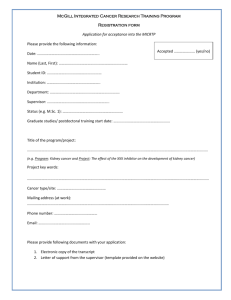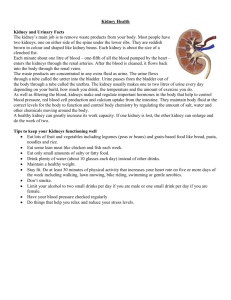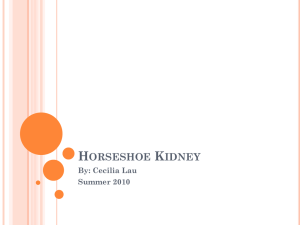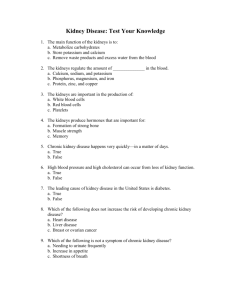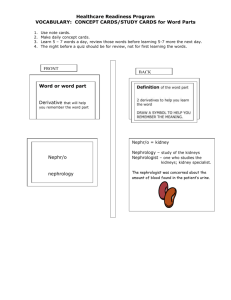Prevention of Chronic Kidney Disease
advertisement
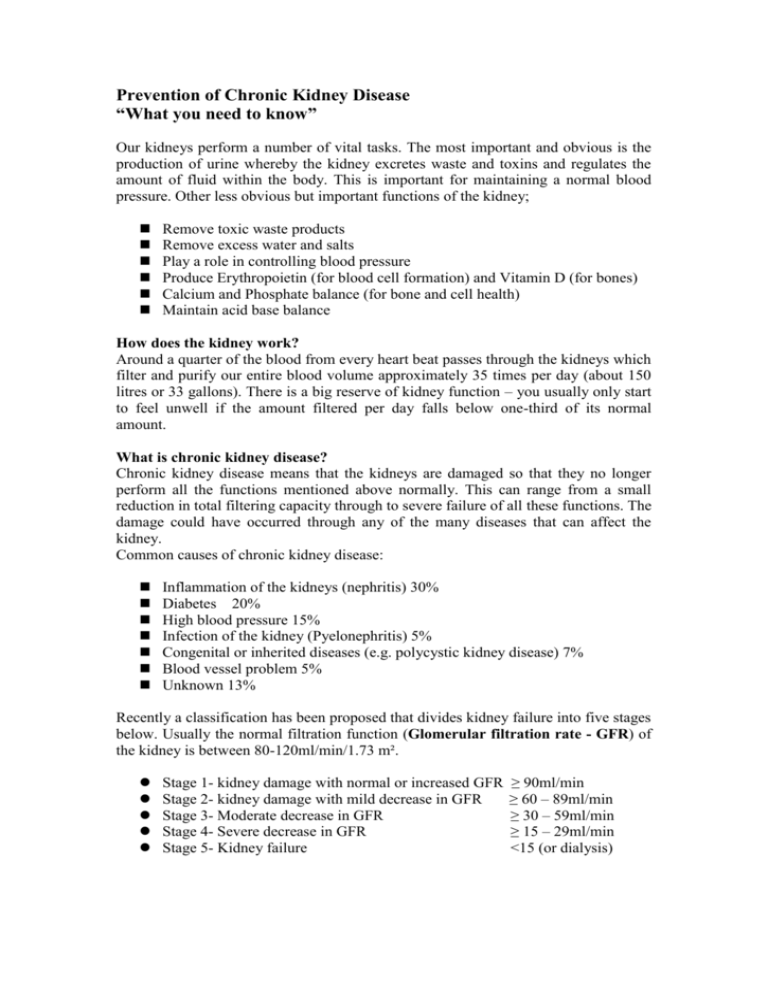
Prevention of Chronic Kidney Disease “What you need to know” Our kidneys perform a number of vital tasks. The most important and obvious is the production of urine whereby the kidney excretes waste and toxins and regulates the amount of fluid within the body. This is important for maintaining a normal blood pressure. Other less obvious but important functions of the kidney; Remove toxic waste products Remove excess water and salts Play a role in controlling blood pressure Produce Erythropoietin (for blood cell formation) and Vitamin D (for bones) Calcium and Phosphate balance (for bone and cell health) Maintain acid base balance How does the kidney work? Around a quarter of the blood from every heart beat passes through the kidneys which filter and purify our entire blood volume approximately 35 times per day (about 150 litres or 33 gallons). There is a big reserve of kidney function – you usually only start to feel unwell if the amount filtered per day falls below one-third of its normal amount. What is chronic kidney disease? Chronic kidney disease means that the kidneys are damaged so that they no longer perform all the functions mentioned above normally. This can range from a small reduction in total filtering capacity through to severe failure of all these functions. The damage could have occurred through any of the many diseases that can affect the kidney. Common causes of chronic kidney disease: Inflammation of the kidneys (nephritis) 30% Diabetes 20% High blood pressure 15% Infection of the kidney (Pyelonephritis) 5% Congenital or inherited diseases (e.g. polycystic kidney disease) 7% Blood vessel problem 5% Unknown 13% Recently a classification has been proposed that divides kidney failure into five stages below. Usually the normal filtration function (Glomerular filtration rate - GFR) of the kidney is between 80-120ml/min/1.73 m². Stage 1- kidney damage with normal or increased GFR Stage 2- kidney damage with mild decrease in GFR Stage 3- Moderate decrease in GFR Stage 4- Severe decrease in GFR Stage 5- Kidney failure ≥ 90ml/min ≥ 60 – 89ml/min ≥ 30 – 59ml/min ≥ 15 – 29ml/min <15 (or dialysis) What are the symptoms? Often mild abnormalities in kidney function have no symptoms and may be discovered by chance during routine blood tests. The symptoms of advancing kidney disease include tiredness, poor appetite, nausea, vomiting, itch, poor sleep and fluid retention (oedema), causing swollen ankles and legs. Clearly, all these symptoms can have many other causes. What tests will I need? Kidney function can be measured in a number of ways. Blood tests can measure the levels of waste products – urea and creatinine- that build up in the blood if the kidneys are working less well. A more accurate measure of function can be calculated by measuring the total amount of waste passed into the urine by the kidneys over 24 hours (24-hour urine collection to measure creatinine clearance), and then comparing this with how much is still in the blood. This gives a measurement similar to the total filtration of the kidney – the glomerular filteration rate. Also using a number of blood tests together, or with your weight and age, blood levels of creatinine can be used to what your total filtration rate (estimated glomerular filtration rate) will probably be. Ultrasound scan can be used to access the size of the kidneys and also identify obstruction and scars. Others are urine testing for protein and blood which are indicators of kidney damage. What is the burden of the disease globally? World wide 50million individuals suffer from progressive chronic kidney disease (CKD). Therefore it is an emerging global epidemic. More than 1 million people are treated with dialysis- 85% in developed world. World Health Organisation (WHO) statistics show CKD as ranking 12th on the list of major causes of death. Heart disease which has CKD as an integral part of it ranked leading cause of death. Both Type 1 and Type 2 Diabetes account for 20- 40% of CKD globally Currently there are 177 million people with Diabetes world wide from WHO estimates. In developing world infectious disease and infestations contribute to the burden of CKD. Can chronic kidney disease be prevented? Chronic means the damage is longstanding and ongoing therefore it is important to be aware as an individual what you should do to prevent. You are more at risk of chronic kidney disease if you: Have diabetes Have high blood pressure Are obese Are over 50 years of age Have a family history of kidney disease Smoke Early detection can be lifesaving Early detection of kidney disease can be life saving. Medication and changes to lifestyle, along with an early referral to a kidney specialist can prevent or delay kidney failure. If you are “at higher risk” of chronic kidney disease, talk to your doctor about having a regular kidney health check. This includes: Blood pressure test Blood test for kidney function Urine test for protein (proteinuria) Lifestyle changes can keep your kidneys healthy Making healthy lifestyle choices can help keep to keep your kidneys functioning well and also lower your risk of high blood pressure and diabetes: Eat lots of fruits and vegetables. Eat lean meat like chicken and fish each week. Eat only small amounts of salty or fatty food. Drink plenty of water instead of sugary drinks. Maintain a healthy weight. Stay fit. Do at least 30 minutes of physical activity that increases your heart rate on five or more days of the week including walking, lawn mowing, bike riding, swimming or gentle aerobics. Don’t smoke. Limit your alcohol to two small drinks per day if you are male or one small drink per day if you are female. Have your blood pressure checked regularly. Do things that help you relax and reduce your stress levels. Medication can help lower blood pressure and control diabetes A range of medications are available for high blood pressure and diabetes. This you can get after consulting your doctor or specialist. The medicines all work in different ways and it is not unusual for more that one type to be prescribed. The dose may alter according to your needs. Things to remember! You can look after your kidneys by eating healthy food, staying active and maintaining a healthy weight. Healthy lifestyle choices can reduce the medication you need or make your medication work better. Many diseases can affect the kidneys Have your blood pressure checked regularly Want to know more? For references, related links and support group information you can go to www.kidney.org www.nephroprevention.com www.diabetesnet.com www.kidneyguide.com




